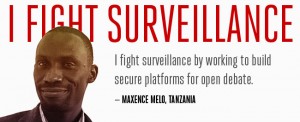 Call it “privacy nihilism.” Whether you’re reading about the latest security breaches across the Net, or the jaw-dropping details of the latest NSA leak, or you’re explaining the importance of crypto to your blank-faced family, or struggling to stop your own government’s plans on burning your right to privacy, it’s sometimes easy to just throw up your hands in despair and give it all up.
Call it “privacy nihilism.” Whether you’re reading about the latest security breaches across the Net, or the jaw-dropping details of the latest NSA leak, or you’re explaining the importance of crypto to your blank-faced family, or struggling to stop your own government’s plans on burning your right to privacy, it’s sometimes easy to just throw up your hands in despair and give it all up.
What can anyone realistically do when online eavesdropping is increasingly pervasive, and governments and companies seem determined to keep it that way? What can anyone do, alone, to change the downward spiral of security and privacy online? It doesn’t help when so many people seem to shrug at the risks and consequences of an omniscient state or cartel, no matter how many times you have explained your fears.
EFF is launching two projects that we hope will help you fight that privacy nihilism: against the skepticism of your friends and colleagues, and even your own wavering sense that you can do something.
In Counter-Surveillance Success Stories, we’ve collected examples of individuals and small groups who have chosen to battle unlawful spying in their own countries—and have won.
 German IndyMedia co-founder Anne Roth found that she was the wife of a suspect in an anti-terrorism case. The evidence was laughably flimsy and the case was dropped, but by documenting the experience of being under surveillance on her blog, she mobilized opposition to Germany’s mistreatment of suspects. In Ireland, Digital Rights Ireland, a small group of volunteer activists, spent eight years on an apparently quixotic quest to completely overturn the EU Data Retention Directive, which ordered ISPs and mobile phone companies across Europe into hoarders of terabytes of data on their own customers. In Zimbabwe, a group fighting the creation of an identity database of all SIM card users in the country used international attention and careful advocacy to annul the law. In Brussels, activists from across Europe battled US government influence and highly-paid corporate lobbyists to expand and improve the European Union’s data protection laws.
German IndyMedia co-founder Anne Roth found that she was the wife of a suspect in an anti-terrorism case. The evidence was laughably flimsy and the case was dropped, but by documenting the experience of being under surveillance on her blog, she mobilized opposition to Germany’s mistreatment of suspects. In Ireland, Digital Rights Ireland, a small group of volunteer activists, spent eight years on an apparently quixotic quest to completely overturn the EU Data Retention Directive, which ordered ISPs and mobile phone companies across Europe into hoarders of terabytes of data on their own customers. In Zimbabwe, a group fighting the creation of an identity database of all SIM card users in the country used international attention and careful advocacy to annul the law. In Brussels, activists from across Europe battled US government influence and highly-paid corporate lobbyists to expand and improve the European Union’s data protection laws.
Even when successful, such meticulous and demanding activism can be slow and lonely work. What if you don’t see a local group that fits your beliefs, and don’t have resources or the know-how to start your own institution? Every action that challenges unlawful surveillance has an effect: and because it’s a global problem, acts anywhere in the world make a difference.
On our new I Fight Surveillance site, we’re showcasing individuals from around the world who are taking a stand. Some are technologists, building the secure tools that protect others. Others are fighting surveillance by using those privacy-protecting tools, or teaching others how to use them. Others publicize the effects surveillance have in their own communities; communities who might not have the power or influence to tell the world on their own.
 The faces and stories of these two sites aren’t necessarily the most famous advocates for privacy, nor are they the most notorious victims of its abuse. They’re certainly not the only ones fighting against surveillance, and we’ll be adding more images and success stories to our collection over the next few months.
The faces and stories of these two sites aren’t necessarily the most famous advocates for privacy, nor are they the most notorious victims of its abuse. They’re certainly not the only ones fighting against surveillance, and we’ll be adding more images and success stories to our collection over the next few months.
But we hope that even this small sample shows that everyone can do something to fight unnecessary and disproportionate digital spying. Whistleblowers, coders and big name politicians are all vital but everyone can and must take part for it to succeed. And that by working individually and together, as technologists and advocates and citizens and activists, we can—and will—build a world without surveillance.
I Fight Surveillance press release available here.


